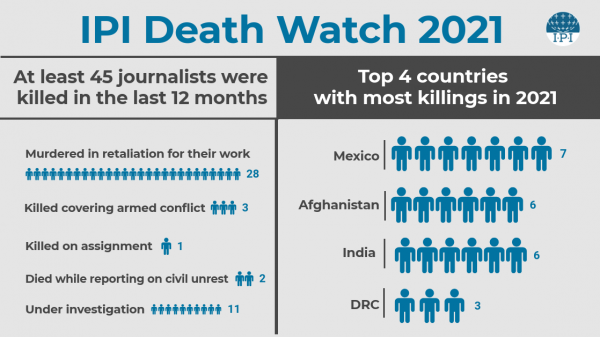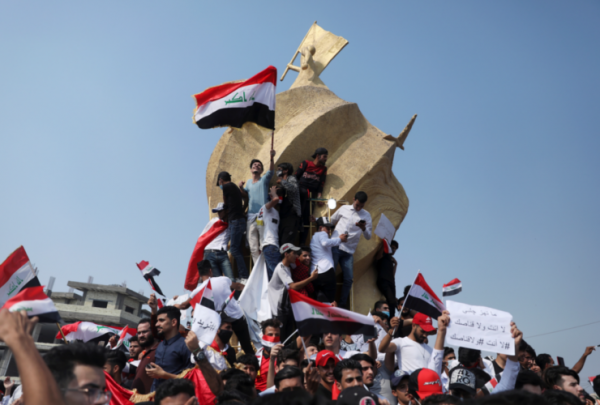Eighteen foreign correspondents with long experience of covering Iraqi Kurdistan have called, in an open letter to the president of the autonomous region, Massoud Barzani, and to Iraqi President Jalal Talabani, to launch an independent investigation into the murder of a young journalist who had criticised the authorities. Noting that they had each covered Kurdish affairs “at great personal risk,” the authors urge the leaders to remember the commitments they made to press freedom before coming to power, and to protect journalists’ right to report and comment on the news without fear of retribution.
The letter says: “In solidarity with our Kurdish colleagues and as friends of the Kurds, we urge you not to imitate the oppressive policies of the regime your people struggled against for so long.
“On many occasions, when you were in hiding in the mountains or in exile, both of you told us of your intention to end the abuses of freedom, including the suppression of the press, in your country.”
IPI strongly supports the letter – the full text of which can be read below:
Open Letter to Massoud Barzani, President of the Kurdistan Region of Iraq, and Jalal Talabani, President of Iraq
Your excellencies,
As journalists who have covered Iraqi Kurdistan for many years, we are writing to express our concern over the apparent deterioration in the right of Kurdish journalists to report and comment freely and in particular about the recent murder of twenty-three year old journalist Zardasht Othman. The Kurdistan Regional Government condemned the killing and stated, “This is a heinous crime and a crime designed to undermine the security of the region and to attack the life and liberty of the people. The relevant security forces are closely investigating this case and are doing their utmost to bring the perpetrators to justice.” We echo the condemnation of the Kurdistan Regional Government. However, given allegations of security force involvement in Mr. Othman’s kidnapping on 4 May and his brutal murder immediately afterwards, we respectfully request that an independent investigation be empowered. Mr. Othman, as you know, was handcuffed, tortured and shot dead, before his family were told to collect his body from the outskirts of Mosul. We further request a public commitment from the Kurdistan Regional Government to Articles V and VI of the Kurdish Press Law of 2008 calling for severe punishment of anyone, including the security forces, who attacks members of the press.
The murder of Mr. Othman, a university student who had written critically of the leadership and published biting satires of a kind that are tolerated by leaders in other democracies, is only the latest in a series of assaults on independent journalism in Iraqi Kurdistan. Last year, Kurdish journalist Soran Mama Hama was murdered in front of his house in Kirkuk after he had written articles that offended government officials. On 20 April 2010, regional security forces attacked at least sixteen Kurdish journalists reporting student demonstrations in Suleimania. Some were beaten severely by police, and others had their cameras taken and their photographs destroyed. On 28 April, police interrogated the editor of the respected journal Hawlati, Kamal Rauf, for five hours after he published information on the absence of public services in a Kurdish village. Another editor, Fuad Sadiq, lost his job for criticizing Prime Minister Barham Salih. Hakim Qubadi Jali Zada, a Kurdish jurist and poet, was dismissed as a judge in Suleimania for writing an article in the newspaper Hawal that disparaged aspects of the judicial system. Despite these and other assaults on Kurdish journalists, no one has been apprehended or charged in a court of law. The effect of the government’s inaction has been to intimidate Kurdish journalists, many of whom rightly fear for their lives.
During the Kurdish struggle against the Iraqi dictatorship, when Kurds suffered savage repression and attempted genocide, the maxim was that the “Kurds had no friends but the mountains.” The truth was that the Kurds had friends in the free press, many of whose members risked their lives to cover Iraqi government crimes against the people. Dana Adams Schmidt of the New York Times in 1963, Peter Sturken of ABC News in 1975, Gwynne Roberts after the massacre at Hallabja and many others raised the alarm to an outside world that would otherwise have been ignorant of the crimes committed against the Kurds. We were always grateful for the protection that the Pesh Merga afforded us on hazardous missions in northern Iraq. All of us who send you this letter have covered your country at great personal risk going back to the revolts against the Iraqi dictatorship by the father of the Kurdish national movement, Mulla Mustafa Barzani. Some of our colleagues, including Gad Gross and Kaveh Golestani, died to bring the news of the Kurds’ suffering to the world. On many occasions, when you were in hiding in the mountains or in exile, both of you told us of your intention to end the abuses of freedom, including the suppression of the press, in your country. We who write to you today do so as friends rather than opponents, as correspondents who believed your words when you were seeking power and as journalists who respectfully remind you of your past commitment to your people’s liberty. This liberty includes the right to expose corruption and, yes, to satirise national leaders.
Kurdish journalism has an honorable tradition dating to the first Kurdish-language newspaper, Kurdistan, in Cairo in 1898. In solidarity with our Kurdish colleagues and as friends of the Kurds, we urge you not to imitate the oppressive policies of the regime your people struggled against for so long.
Yours sincerely,
Geraldine Brooks
Gérard Chaliand
Charles Glass
Yves Harté
Cécile Hennion
David Hirst
Jim Hoagland
Marc Kravetz
Chris Kutschera
Quil Lawrence
François-Xavier Lovat
David McDowall
Edward Mortimer
Fabrice Moussus
Jim Muir
Jonathan Randal
Hazhir Teimourian
Martin Woollacott


